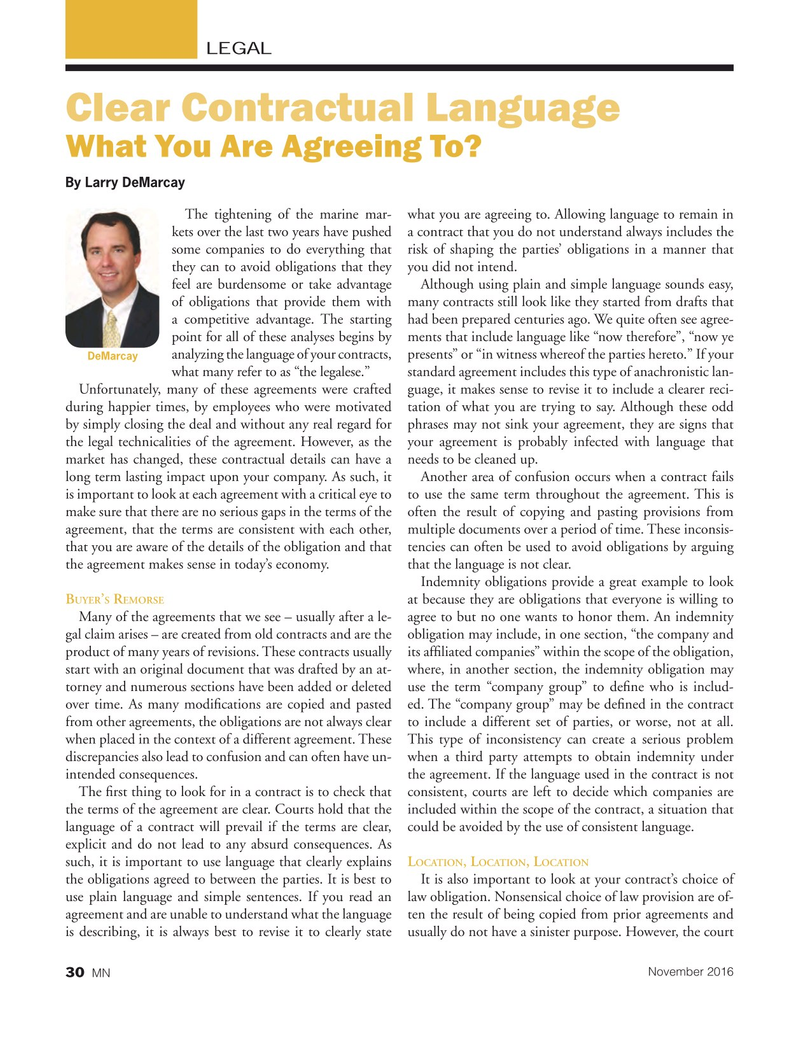
Page 30: of Marine News Magazine (November 2016)
Workboat Annual
Read this page in Pdf, Flash or Html5 edition of November 2016 Marine News Magazine
LEGAL
Clear Contractual Language
What You Are Agreeing To?
By Larry DeMarcay
The tightening of the marine mar- what you are agreeing to. Allowing language to remain in kets over the last two years have pushed a contract that you do not understand always includes the some companies to do everything that risk of shaping the parties’ obligations in a manner that they can to avoid obligations that they you did not intend. feel are burdensome or take advantage Although using plain and simple language sounds easy, of obligations that provide them with many contracts still look like they started from drafts that a competitive advantage. The starting had been prepared centuries ago. We quite often see agree- point for all of these analyses begins by ments that include language like “now therefore”, “now ye analyzing the language of your contracts, presents” or “in witness whereof the parties hereto.” If your
DeMarcay what many refer to as “the legalese.” standard agreement includes this type of anachronistic lan-
Unfortunately, many of these agreements were crafted guage, it makes sense to revise it to include a clearer reci- during happier times, by employees who were motivated tation of what you are trying to say. Although these odd by simply closing the deal and without any real regard for phrases may not sink your agreement, they are signs that the legal technicalities of the agreement. However, as the your agreement is probably infected with language that market has changed, these contractual details can have a needs to be cleaned up.
long term lasting impact upon your company. As such, it Another area of confusion occurs when a contract fails is important to look at each agreement with a critical eye to to use the same term throughout the agreement. This is make sure that there are no serious gaps in the terms of the often the result of copying and pasting provisions from agreement, that the terms are consistent with each other, multiple documents over a period of time. These inconsis- that you are aware of the details of the obligation and that tencies can often be used to avoid obligations by arguing the agreement makes sense in today’s economy. that the language is not clear.
Indemnity obligations provide a great example to look
B ’ R at because they are obligations that everyone is willing to
UYER S EMORSE
Many of the agreements that we see – usually after a le- agree to but no one wants to honor them. An indemnity gal claim arises – are created from old contracts and are the obligation may include, in one section, “the company and product of many years of revisions. These contracts usually its af? liated companies” within the scope of the obligation, start with an original document that was drafted by an at- where, in another section, the indemnity obligation may torney and numerous sections have been added or deleted use the term “company group” to de? ne who is includ- over time. As many modi? cations are copied and pasted ed. The “company group” may be de? ned in the contract from other agreements, the obligations are not always clear to include a different set of parties, or worse, not at all. when placed in the context of a different agreement. These This type of inconsistency can create a serious problem discrepancies also lead to confusion and can often have un- when a third party attempts to obtain indemnity under intended consequences. the agreement. If the language used in the contract is not
The ? rst thing to look for in a contract is to check that consistent, courts are left to decide which companies are the terms of the agreement are clear. Courts hold that the included within the scope of the contract, a situation that language of a contract will prevail if the terms are clear, could be avoided by the use of consistent language.
explicit and do not lead to any absurd consequences. As
OCATION OCATION OCATION such, it is important to use language that clearly explains L , L , L the obligations agreed to between the parties. It is best to It is also important to look at your contract’s choice of use plain language and simple sentences. If you read an law obligation. Nonsensical choice of law provision are of- agreement and are unable to understand what the language ten the result of being copied from prior agreements and is describing, it is always best to revise it to clearly state usually do not have a sinister purpose. However, the court
November 2016
MN 30
MN Nov16 Layout 18-31.indd 30 10/24/2016 12:37:42 PM

 29
29

 31
31
